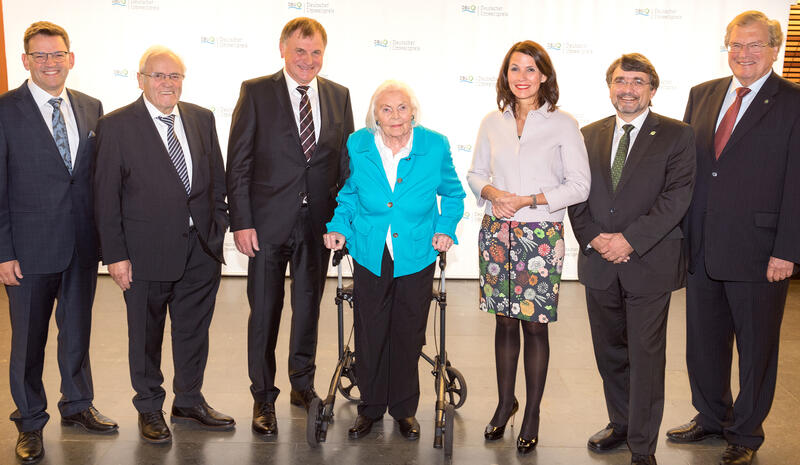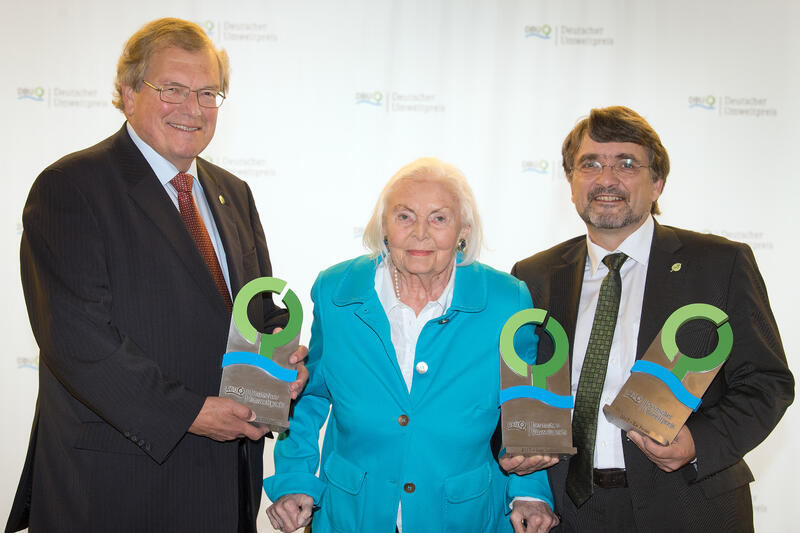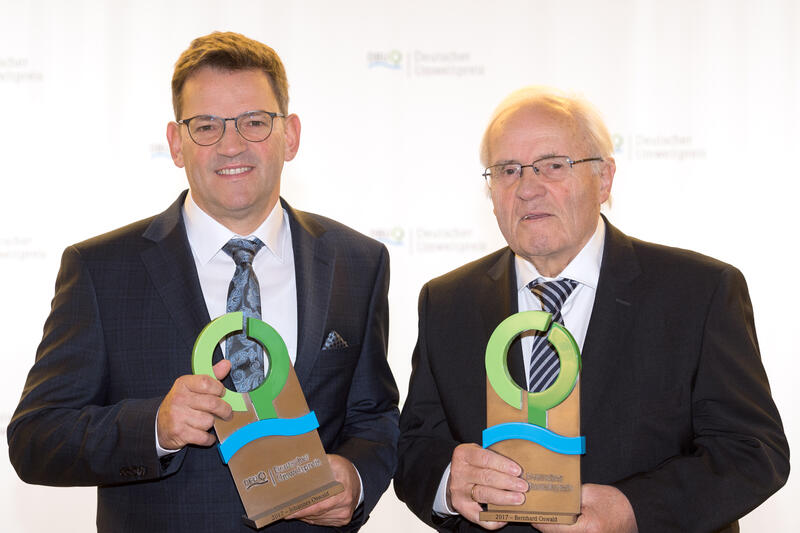German Environmental Prize Message: Do not burden the Earth’s ecological systems to the breaking point
Braunschweig. The German Environmental Prize has been awarded for the twenty-fifth consecutive year by the German Federal Environmental Foundation (Deutsche Bundesstiftung Umwelt, DBU). Today in Braunschweig, German President Frank-Walter Steinmeier and the DBU Board Chairperson and Parliamentary State Secretary in the Federal Environmental Ministry, Rita Schwarzelühr-Sutter, presented to the entrepreneurs Bernhard (87) and Johannes Oswald (57, of Miltenberg) and to the conservationists Inge Sielmann (87, of Munich), Dr. Kai Frobel (58, of Nürnberg) and Prof. Dr. Hubert Weiger (70, of Fürth) the largest independent environmental prize in Europe, which is endowed with € 500,000. With this award, the DBU emphasizes the great significance of protecting the climate and nature, and of sustainability-based business management for a viable future way of life which does not overburden the Earth’s ecological systems. The Oswalds receive € 245,000, as do Sielmann, Frobel and Weiger collectively. The DBU’s Honorary Lifetime Achievement Award, endowed with € 10,000, was awarded posthumously to the former Foreign Minister of the Marshall Islands, Tony de Brum.
Motors which require no transmission oil, use less energy, and are quieter
The DBU pointed out that Johannes and Bernhard Oswald have substantially improved the energy efficiency and productivity of – among others - industrial crushing and pressing machines through the work of their company OSWALD ELEKTROMOTOREN, and that they are pioneers in this environmentally-friendly innovation. They were said to represent small- and medium-sized family businesses in Germany, for whom the nation is of vital importance as an industrial location. Their torque motors, in comparison to other mechanical and hydraulic drive solutions, reduce energy consumption by up to 50 percent, eliminate the need for transmission oil, are lighter, require less space, produce lower operating costs, and are quieter. With their drive systems, which can be custom-designed to meet specific customer requirements, the OSWALD family has reached the status of worldwide market leader. Beyond their commitment to the company, the firm leaders are personally very active in various associations and demonstrate an extraordinary level of regional civic involvement.
Committed friends of nature secure protected habitats for plants and animals
As trailblazers of the “Green Belt”, the first and largest pan-German nature conservation project, the DBU honored Inge Sielmann, Honorary Chairperson of the Heinz Sielmann Foundation; Dr. Kai Frobel, Coordinator of the nationally and internationally active Projektbüro Grünes Band (“Green Belt Project Agency”) of the German Association for Environment and Conservation (Bund für Umwelt und Naturschutz Deutschland, BUND); and Prof. Dr. Hubert Weiger, Chairperson of BUND. Only through the love of committed friends of nature, for which this trio stands, has it been possible to preserve the approximately 1,400-kilometer-long former border between West and East Germany for the plant and animal world, which had found a haven within the former “Death Strip”, it was stated. Through the work of Sielmann, Frobel and Weiger, a vision was brought to life in Germany of a European initiative for the Green Belt, and a symbol was created for the surmounting of the Cold War.
Vision of a “Green Belt” for Europe developed
Inge Sielmann, widow of the 2005 DBU Honorary Lifetime Achievement Award recipient, Heinz Sielmann, has resolutely continued her late husband’s work and has added her own contributions, above all in environmental education. Frobel is the initiator and namegiver of the Green Belt; it was stated that, long before German reunification, he laid the foundation for the first and largest pan-German nature conservation project. As early as the 1970s and 1980s, his scientific works and writings were said to have demonstrated for the first time on a nationwide basis the high nature-oriented potential and the major significance of the border strip. In 1998 he founded the nationally and internationally active BUND Green Belt Project Agency, and is still its coordinator. Along with Frobel, Weiger was said to have advanced the pan-German “people-binding” character of the project with its orientation to interdisciplinary dialogue, and to have “thought beyond” the borders of Germany to develop the vision of a European Green Belt. As a member of numerous boards, he is credited with having earned special recognition for his work in the preservation of the former border strip.
Giving Pacific Island Nations a Voice in the 2015 Climate Accords
It is in substantial measure due to Tony de Brums’ personal commitment and diplomatic skill, as a dedicated representative of the Pacific Island Nations, that the 2015 Paris Climate Accords were signed, according to the DBU. At that time the community of nations codified the limitation of anthropocene global warming to well below two degrees in comparison to preindustrial levels. Above all, De Brum gave a voice to the nations and regions which are predicted to be most seriously threatened by the impact of climate change through a constantly rising sea level and stronger storms.

© DBU/Peter Himsel

© DBU/Peter Himsel

© DBU/ Peter Himsel